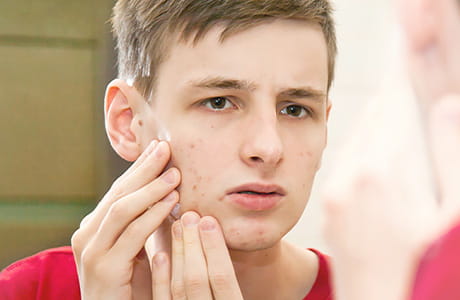Dots, spots and bumps: What’s that mark on your lip?
Learn when to seek treatment for sores and discoloration.
Your lips say a lot about your health. If you notice a bump, spot or sore on them it may be a reason to see your doctor. Or it may be nothing to worry about.
"If you’ve got a sudden spot on or around your lips there could be a number of causes, some more serious than others," says Geisinger dermatologist Sarah Telliard, MD.
Let’s break it down by appearance.
Spot or discoloration on lip
A spot or discoloration on your lip can happen for several reasons. A few common causes include:
Hyperpigmentation
Hyperpigmentation is when an area of skin appears to be darkened. This can happen anywhere on the body, not just on the lips. It happens when the pigment producing cells in the skin (melanocytes) are stimulated to produce more of the substance that gives skin its color (melanin). This shows up on the skin as a dark mark or area.
Hyperpigmentation can be caused by:
- Sun exposure
- Taking medications that cause sensitivity to light
- Adrenal disorders, such as Addison’s disease
- Vitamin or mineral deficiencies (vitamin B12, folic acid or iron)
- Thyroid disorders
- Genetic factors
Hyperpigmentation is not always a matter of concern, but any new lesions should be checked by your dermatologist.
Skin cancer
A discolored or dark spot on your lip may be skin cancer. Skin cancer on the lip is common but often overlooked; when people apply sunscreen to their face and body, they often don’t consider also using a lip balm with SPF. Both basal and squamous cell carcinoma, the two most common types of skin cancer, could be found on the lip.
If you notice a red or dark spot on your lip, you should see your doctor.
"Since spots on your lips are highly visible, they’re more likely to be found early," says Dr. Telliard. “Your dermatologist can help to determine that best treatment. If there is concern for skin cancer, a biopsy may be performed.”
Venous lake
A venous lake, which is a purple or dark blue spot commonly found on lips and ears, is caused by dilated blood vessels. Though they may resemble melanoma, venous lakes do not evolve into cancer and are generally not life threatening. Still, some people opt to have them surgically removed for cosmetic purposes.
Bump or pimple on lip
A bump, sore or pimple on your lip can be annoying and sometimes painful, but often, they’re harmless. Most of these conditions require no treatment and clear up on their own. Some conditions can be treated at home, too.
However, if you notice a bump on your lip that comes and goes or that isn’t going away on its own or getting worse, visit your doctor.
Here are some common causes of bumps, lumps and pimples on lips.
Cold sore
A cold sore is an infection caused by the herpes simplex virus (HSV). These often-painful blisters are typically caused by HSV 1 but can sometimes be caused by HSV 2, known as genital herpes. About 90% of all people get at least one cold sore in their life, often in childhood. Then they develop antibodies and never have a second one. Cold sores typically last seven to 10 days, and during that time, the virus can be transmitted by kissing someone or sharing items like utensils, razors or towels.
Talk to your doctor if you have sores on your lips. A lab test can determine if HSV is the cause. Oral and topical medications are available to treat and prevent these lesions.
Contact dermatitis
Sometimes contact with a common item such as lipstick, lip balm or even certain toothpaste ingredients can cause scaly, sore, itchy lesions on the lips. Avoiding the offending substance and treatment with topical steroid creams typically help with contact dermatitis.
Farmer’s lip
If your lips are often dry or you have a persistent scaly spot on your lower lip, you could have actinic cheilitis, or farmer’s lip. This patch of dry, inflamed skin resulting from long-term exposure to the sun can sometimes evolve into cancer. Your doctor will want to monitor this spot for any changes in color or shape or possibly biopsy the lesion.
Canker sore
A canker sore is a small, flat ulcer that can occur on the lip or inside the mouth. Unlike a cold sore, a canker sore isn’t contagious, but it can be painful and make eating and drinking challenging. These sores tend to appear in adolescence and, if triggered, can continue to pop up throughout a person’s life.
Triggers for canker cores include:
- Stress
- Food sensitivities
- Allergic reactions
- Vitamin deficiencies
- Oral injury
“Knowing what triggers your canker sores and how to prevent outbreaks can make a world of difference in your quality of life,” says Dr. Telliard. “If you have canker sores, talk to your doctor to make sure you have the proper diagnosis. Medications can help with painful lesions and even minimize outbreaks.”
When to see a doctor
If a sore on your lip is accompanied by other symptoms, it might be time to see a doctor. Symptoms that are cause for concern include:
- Sudden swelling
- A rash that spreads rapidly
- Uncontrollable bleeding
If you’re not sure whether to seek medical care, an appointment with your doctor can ease your mind.
"If you notice a change in your lips and are unsure what’s causing it, it’s best to see your doctor," says Dr. Telliard.
Next steps:
Learn about dermatology at Geisinger
Make a primary care appointment
How to get rid of dry skin





